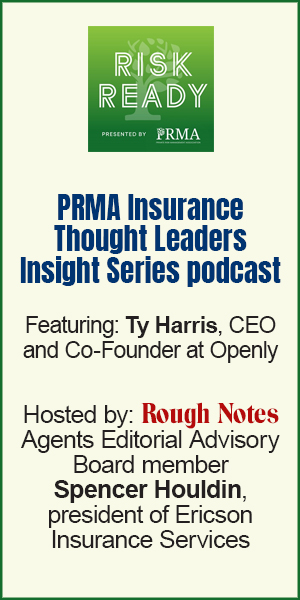Blasted Myths
Receive a wealth of constructive feedback by implementing the NPS correctly
Successful insurance agents will tell you that healthy client relationships are vital to their business. It’s what separates them from their competitors. But ask the same agents how they track customer loyalty and you’ll likely be met with a blank stare. Although monitoring the pulse of their agency is important, they’ve probably found that persuading people to provide feedback can be quite difficult. They may even be correct in thinking that most clients have contracted “survey fatigue” and won’t answer anything that takes more than a couple of minutes to complete.
Worse than that, traditional client satisfaction surveys usually ask the wrong questions to begin with. Combined with the worry of “bothering their clients,” many insurance agencies eschew collecting client feedback altogether. So agents are often left wondering what their clients think about them, missing opportunities for client referrals and higher retention. The good news? Contrary to what you might think, client surveys can work—that is, if you’re asking the right questions.
At Rocket Referrals, we’ve had success integrating the Net Promoter Score (NPS) survey into our software. The NPS is a different breed of survey, assessing client loyalty as opposed to satisfaction. This is a critical distinction. Oftentimes a client can be “satisfied” but never refer, or, worse, defect when a cheaper policy catches their eye. A loyal client, on the other hand, is a true promoter and much more likely to recommend and be retained.
Over time, every client is asked to rate the agency on an 11-point scale, and to give feedback supporting their response. The responses are averaged, and a score from -100 to +100 is given. Promoters (loyal clients) often provide testimonials, online reviews, and referrals, whereas detractors spell out ways the business can improve. Both are helpful. Moreover, due to the simplicity of the NPS, agents will routinely collect responses from over 45% of their client base.
To better understand how the NPS can be used to benefit insurance agents, we interviewed a client of ours, Larry Freudenberg, president of Triest Agency in Charleston (www.triestagency.com). He told us about an interesting program he implemented in his agency using the NPS survey with Rocket Referrals. When his employees reach an individual NPS score of 90 or higher, he rewards them with a $100 bonus and a trophy celebrating their induction into the “Ninety Society of Triest Agency.” This benchmark for customer loyalty is a full 60 points higher than the industry average and represents Larry’s concerted effort to develop and maintain positive client relationships.
Encourage positivity, inspire your agents, breed competition
If implemented correctly, the NPS will foster a wealth of constructive feedback for an insurance agency. Our clients are always surprised at the sheer number of people willing to say good things about them. As a result, the staff working the front lines are consistently reminded of the direct impact they have on the lives of their clients. This feedback provides a needed sense of worth and markedly improves workplace morale.
Too often, business owners overlook the importance of rewarding their staff for a job well done. Partly to blame is the absence of regular feedback from clients, which often forces managers to judge performance on anecdotal information. The NPS solves this problem by automating consistent feedback that can often be linked directly to one employee. Leaders can analyze NPS responses and offer positive reinforcement based on a metric of client loyalty. In addition to increasing job commitment and fulfillment, this lays the foundation for a client-centric agency and clearly defines agency goals and expectations.
“Instead of working from a negative, which is common in most agencies, we’re rewarding based on positives. This feedback really charges up my people.”
—Larry Freudenberg
President
Triest Agency
Ever since highlighting the importance of the NPS, Larry Freudenberg has witnessed a shift in the behavior of his employees. He’s found that positive reinforcement has produced more energy and fulfillment within his agency—creating a buzz around the goal of best serving their clients. When Larry offered a reward for employees reaching a score of 90 or above on the NPS, he set a direct and measureable goal to strive for. He noted: “I have seen that my staff really responds to the testimonials and ratings that they receive. I find them competing for them. Instead of working from a negative, which is common in most agencies, we’re rewarding based on positives. This feedback really charges up my people. They eat it up.”
Appreciate your rock stars
With all the feedback pouring in, Larry soon discovered the rock stars of the office, those team members who make a significant impact on customer loyalty and the overall success of his agency. Many of the testimonials were filled with enthusiastic praise, mentioning things like how much they like Theresa, or how Matt went beyond expectations.
As Larry said, his staff relished the feedback. Not only did it validate their hard work, it also brought it to center stage for others to see. Furthermore, Larry was able to better recognize and reward his best performing employees. He placed more confidence in his rock stars and increased their responsibilities and face time with clients. Happier clients and happier staff all in one fell swoop!
Improve agency transparency
In the last decade, the NPS survey has been growing in popularity across a diverse range of industries—the quickest adopters being the most customer-focused companies, such as Apple, Southwest Airlines, Zappos, and others. Because the NPS survey is conducted regularly (semi-annually at a minimum), business leaders are able to identify trends and gauge loyalty over time.
To date, the overwhelming majority of independent insurance agencies don’t currently have a system in place to collect customer feedback (with the goal of collecting and acting on the responses). The occasional customer satisfaction survey or “tell us what you think” link below an email signature doesn’t cut it. With this lack of insight into their client base, most agents are essentially flying blind when making decisions that impact their bottom line.
This includes identifying things they are doing right that resonate with their clients. Happy customers are usually willing to express what it is they like about their insurance agency. But, believe it or not, client feedback is especially valuable when it isn’t positive. Negative responses are useful for several reasons. First, they shed light on potential problems inside the agency, including inefficient processes, poor follow-up, or even bad apples on the payroll.
Larry reflected: “I’ve found over the years that some employees will fool management into thinking that they’re doing an outstanding job, when in reality they’re not. This type of behavior is hard to spot, and it could take months or even years to find out they’re not doing their job. With this system, I have a concrete metric to judge employees.”
When a client gives a low score on the NPS survey, it gives the agency a chance to resolve the issue before the client shops around. Many agents are surprised to learn that the majority of their defectors don’t leave because of high premiums. Truth is, agents can usually prevent turnover by getting ahead of issues.
When asked about how he responds to negative feedback, Larry said, “The negative feedback can be broken down into customers who have gotten poor service, those who need more attention, and the ones who are just grumpy. With the regular feedback, we can respond to these clients sooner rather than later. We follow up with any negative comments, usually the same day, to see what we can do to provide a better experience.”
Personalize communication and drive action
A key differentiator for insurance agents is their ability to offer tailored and personal service. Although this is certainly to their advantage, there is also the expectation that they maintain this level of service for all new and existing customers—a difficult task, no less for large agencies with thousands of clients, all longing for meaningful communication. Regular contact with customers is so important, in fact, that when it’s missing, it accounts for 81% of all negative feedback that insurance agents receive.
One great aspect of the NPS survey is its ability to gather information that is helpful in further personalizing communication to clients, thus achieving specific goals like referrals, cross sales, and overall retention. Without this level of personalization, insurance customers quickly feel disconnected from the agency. This can exacerbate problems with detractors (those scoring 0-6 on the NPS survey) and lead to missed growth opportunities with promoters (those scoring 9-10). For example, a client who is upset that an agent never returned a phone call isn’t going to be thrilled about an email probing for cross sale opportunities and is likely to find blanket newsletters just as aggravating. This perceived indifference sets in and price suddenly becomes an issue (which is more than likely just a nice excuse for the client to leave).
On the other hand, clients scoring high on the NPS survey present an excellent opportunity for revenue growth. They’ve indicated a likelihood to recommend, so the responsibility lies on the agent to make it easy for them to do so. By identifying promoters, agents know whom to focus on when encouraging written testimonials, social media shares, online reviews, and the like. As a matter of fact, Triest Agency has used this approach to amass more than 80 reviews across Google, Facebook, and Yelp. It’s also collected over 200 testimonials—with more surely to come—many of which are sent directly to its website under a page titled Triest Raving Fans.
The testimonials and online reviews not only increase retention and credibility, but they also significantly improve the chances of being found by prospects searching for insurance online. Overall, Larry’s strategy of leveraging automation to engage his clients has contributed to his most profitable year in the agency’s 114-year history. Who would have thought there was so much potential energy among existing clients?
The author
Carl Maerz is the co-founder of Rocket Referrals, an automated communication strategy that helps agencies improve their referrals, retention, reviews and relationships. He aims to help local agencies leverage their advantages over direct carriers by replacing common industrial myths with relevant and practical advice. Contact Carl at carl@rocketreferrals.com






